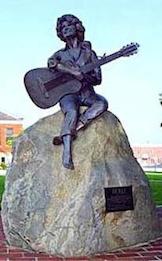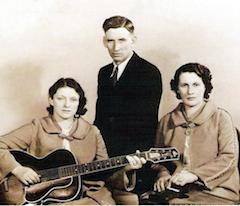Old Time Smoky Mountain Music

The late 1930s were a tumultuous time when hundreds of families were leaving or had left their mountain farms to make way for the creation of the new national park. In 1939 Columbia University graduate student Joseph Hall arrived expecting to record the speech and stories of these residents and used a borrowed pick-up truck to lug some early recording equipment all around the Great Smoky Mountains. Fortunately for us, many of them wanted to sing and play for him instead of talking, so he was able to capture an amazing variety of music: ballads from the British Isles, American ballads, gospel, folk, country, and blues.
On the Old-Time Smoky Mountain Music CD are 34 long-buried selections available to the public for the first time. They include: My Home is in the Smoky Mountain, Sourwood Mountain, John Henry, Don't Forget Me Little Darling, On Top of Old Smoky, and many more. Also included is a 40-page booklet with all song lyrics, historic photos, and authoritative essays on the history of mountain music. Available exclusively from Great Smoky Mountains Association.
**Nominated for a 2013 Grammy Award for Best Historical Album**
Press release from Great Smoky Mountains National Park
Below are two selections from the CD, along with the liner notes and lyrics, so sing along!
My Home Is in the Smoky Mountain
Sung elsewhere in Appalachia as “My Home’s Across the Blue Ridge Mountains,” this lyric folk song palpably and powerfully expresses pride in being attached to the mountains. The Carter Family recorded the song in the 1930s, and it regained popularity during the urban folk revival of the late 1950s and 1960s. Doc Watson, Clarence “Tom” Ashley, Joan Baez, and Townes Van Zandt, among other musicians, have recorded versions of this song.

Sung and Played in 1939 by John Hannah—Little Cataloochee, Haywood County, North Carolina (3:11)
Carter Family
My home is in the Smoky Mountain,
Home is in the Smoky Mountain,
Home is in the Smoky Mountain,
And I never expect to be there anymore.
How can I keep from crying,
How can I keep from crying,
How can I keep from crying,
When I never expect to be here anymore?
I thought I heard a freight train blowing,
I thought I heard a freight train blowing,
Thought I heard a freight train blowing,
And I never expect to hear it blown no more.
How can I keep from crying,
How can I keep from crying,
How can I keep from crying,
When I never expect to be here anymore?
I’m leaving here this Monday morning,
Leaving here this Monday morning,
Leaving here this Monday morning,
I never expect to be here anymore.
Goodbye, my little Thelma darling,
Bye, my little Thelma darling,
Bye, my little Thelma darling,
And I never expect to be here anymore.
How can I keep from crying,
How can I keep from crying,
How can I keep from crying,
When I never expect to be there anymore?
Don’t the road look rough and rocky?
Don’t the road look rough and rocky?
Don’t the road look rough and rocky?
I never expect to be here anymore.
How can I keep from crying,
How can I keep from crying,
How can I keep from crying,
When I never expect to be here anymore?
Little Rosewood Casket
This popular, sentimental nineteenth-century parlor song began as an 1870 broadside entitled “Package of Old Letters.” Its tune was composed by Louis P. Goulland and Charles A. White. The song appeared as a written transcription in a 1932 book, Favorite Mountain Ballads and Old Time Songs, credited to Asher Sizemore and Little Jimmy, and was thereafter sung in traditional environments (in churches and homes) as well as commercial contexts (recorded by such urban folk revival musicians as Jean Ritchie and by such Country stars as Hank Thompson, Marty Robbins, and Dolly Parton).
Sung in 1939 by Myrtle Conner—Gatlinburg, Sevier County, Tennessee (2:05)
There’s a little rosewood casket
Sitting on a marble stand,
There’s a package of love letters
Written by my true love’s hand.
Will you go and get them, brother?
Come sit down beside my bed,
Lay your head upon my pillow
For my heart is almost dead.
I will listen while you read them
And perhaps may fall asleep,
Fall asleep to wake with Jesus
Dearest brother, do not weep.
Last night I caught him nodding
With a lady by his side,
And I thought I heard him tell her
That she could not be his bride.
Go and meet him at the gateway
Go and meet him at the door,
Tell him that I will forgive him
If he’ll court that girl no more.
Come and press me to your bosom
Let me gaze into your eyes,
Come and kiss your darling sister
Oh, it is so hard to die.
When I’m dead and in my casket
And my friends be crowded round,
My poor body may be hallowed
In some lonesome churchyard ground.
This CD album, as well as Old-Time Bluegrass from the Great Smoky Mountains: Carroll Best and the White Oak String Band (which features music recorded by Joseph Hall in 1956), can be ordered through the official Great Smoky Mountains Association store at









